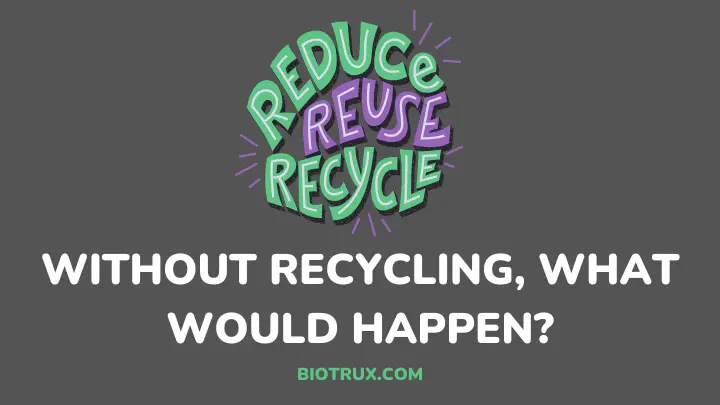Have you ever thought about what the world would be like without recycling? If so, you’re not alone. Every day millions of people worldwide decide to recycle – but what if that choice weren’t available? Without recycling, what would happen?
Without recycling, our world may become inhospitable, unable to support us humans and other living creatures. We may see an increase in pollution, a decrease in resources, and an overall destabilization of the environment.
There are so many misconceptions surrounding recycling. However, it is a simple process that can be easily implemented with minimal effort—yet its effects are potentially huge.
In this article, you’ll explore the implications of not recycling and discuss why it’s essential for us as individuals to make an effort to reduce our waste.
Why is Recycling So Important?

Recycling is critical to protecting the environment and sustaining our planet’s resources. Here are five reasons why recycling is so important:
- Reducing pollution: By recycling materials that would otherwise be discarded and end up in landfills, we can prevent the release of toxic gases such as methane, helping to reduce air pollution.
- Conserving resources and energy: Materials recycled rather than made from raw materials require significantly less energy and resources.
- Creating jobs: The recycling industry creates hundreds of thousands of jobs each year and supports communities worldwide.
- Promoting health: Recycling reduces the need for waste disposal sites which can cause harm to health by contaminating soil and water.
- Foster economic growth: Recycling fosters an efficient market for recyclable materials, creating revenue streams for businesses while stabilizing commodity prices and decreasing demand for virgin resources.
Recycling helps us preserve our natural environment from further degradation and sustain its resources for future generations.
So, Without Recycling, What Would Happen?
1. Increase in landfill waste
Landfills are an environmental hazard that poses significant environmental and public health risks. Uncollected waste accumulates in landfills, leading to increased pollution from decomposing materials, direct runoff of toxins, and methane gas emissions.
Additionally, when waste is sent to a landfill, it is eliminated from the waste stream, meaning that resources that could be reused or recycled, such as paper and metal, are lost. As landfill waste continues to accumulate, these adverse effects will only worsen.
Furthermore, landfills often occupy large amounts of space, destroying habitats and ecosystems. By increasing recycling efforts and reducing waste sent to landfills, we can preserve our environment and lessen the potential threat of releasing toxins into the environment.
2. Air pollution
Air pollution is one of the most significant risks that will happen without recycling. When materials are not recycled, they are often burned or disposed of in landfills, which releases pollutants into the atmosphere.
These pollutants include carbon dioxide and other greenhouse gases contribute to global warming and climate change. Furthermore, burning materials also produces small particles and other toxins that people can inhale, leading to respiratory and cardiovascular illnesses.
In addition to these direct health effects, air pollution can damage ecosystems by reducing sunlight exposure, disrupting photosynthesis, and preventing nutrient cycling.
Ultimately, air pollution from improper waste disposal is a critical consequence of failure to recycle materials properly. It is a serious environmental threat that must be addressed.
3. Water pollution
Water pollution is one of the most pressing environmental issues we face today. Without proper waste management and recycling, toxic substances such as metals, oils, and detergents can enter our precious water resources.
This threatens the health of our ecosystems, wildlife, and human populations. In addition, pollutants like fertilizers, pesticides, and industrial chemicals can degrade water quality and cause algae blooms, depleting oxygen levels in lakes and rivers.
This can lead to fish kills, decreased water clarity, and impaired drinking water supplies. Moreover, plastic packaging materials and beverage containers can take centuries to decompose in landfills, leaching toxins into groundwater and soil over time.
Promoting recycling and proper waste disposal practices can drastically reduce waste entering our waterways and protect our environment from further degradation.
4. Resource depletion
Resource depletion is a serious risk that can happen without effective recycling. The primary source of resources is the Earth itself, and when it is exploited through mining, oil drilling, or other extraction processes, the natural supply can be exhausted.
If societies continue to rely on non-renewable resources such as fossil fuels, metals, and minerals, these resources will eventually run out. This depletion of resources could have disastrous consequences for the planet.
Recycling recovers necessary materials each time we use them, resulting in a vicious cycle that further depletes our limited supply of natural resources. Recycling reduces the need for raw materials and energy, protecting against resource depletion and reducing waste sent to landfills.
We must reduce our consumption and use resources more efficiently to mitigate this risk.
5. Negative impact on wildlife
Recycling helps determine what will happen to the vast amount of waste products entering the environment, directly and substantially impacting wildlife. Many species rely on the delicate balance of their ecosystems to survive, and when that balance is disturbed, the consequences can be threatening.
Without proper recycling measures, human activities will continue introducing toxic pollutants into their natural wildlife habitats. This leads to population decline through habitat destruction and contamination.
Waste products accumulate in certain areas, creating dangerous garbage patches in oceans and rivers that can damage fragile marine ecosystems. Additionally, many common items are made from materials that are not biodegradable, such as plastic bottles.
When these items are discarded and left to decompose in the environment, they release microplastics and other chemicals, which can cause serious injury and death to animals who ingest them. It is clear that without the practice of responsible recycling habits, the negative impact on wildlife is risky.
Consequences of Not Recycling on the Economy
The economic impact of not recycling is far-reaching and costly. Waste management companies face increased costs as more non-recyclable waste is sent to landfills, leading to higher taxes for citizens.
Many industries that rely on raw materials like wood and paper can also see their costs rise if recycling is neglected. Without the recovery of recyclable materials, businesses must spend money buying new resources to replace the ones that are not being reused.
Additionally, without a proper recycling system, the environment suffers from the consequences of pollution; rivers become contaminated, air quality declines, and land becomes unfit for use.
Globally, pollution caused by a lack of responsible waste disposal could cost millions of dollars in clean-up and remediation costs. Recycling is essential in protecting our economy, both now and in the future.
What Are Possible Alternatives to Recycling?
Recycling is an effective way to preserve resources. However, other options such as reduction, reuse, composting, incineration, and landfills can help reduce our environmental footprint.
Reduction involves using fewer resources in the first place by engaging in energy efficiency, water conservation, and avoiding single-use items.
Reuse involves using products and materials multiple times rather than discarding them after one use. This can be achieved through strategies such as refilling bottles, using cloth bags instead of disposable ones, and repurposing or repairing items when possible.
Composting is a viable option that converts food waste and other organic material into nutrient-rich soil perfect for gardening. Incineration and landfills are alternatives but far less desirable due to their lack of resource preservation and higher environmental impact.
Combining these alternatives can assist in managing waste effectively while reducing our effect on the environment.
FAQs
Can’t we just dispose of waste in landfills instead of recycling?
Disposing of waste in landfills is not a sustainable solution. Landfills have limited space and can quickly fill up, causing environmental and health hazards. Additionally, decomposing waste in landfills produces harmful gases contributing to environmental issues.
Is it possible for one person to make a difference by recycling?
Yes, one person can make a difference by recycling. By recycling, you can reduce the amount of waste in landfills and conserve natural resources. Additionally, by recycling, you can help promote a culture of sustainability and inspire others to take action.
How does recycling affect the environment?
Not recycling contributes to environmental degradation through increased landfill waste, pollution of air and water, and depletion of natural resources.
Final Thoughts: Without Recycling, What Would Happen?
You’ve seen the consequences of not recycling: overflowing landfills, polluted waterways, and more. But the future can still be changed – by understanding the value of recycling, investing in sustainable materials, and, most of all, talking to others about why it’s important.
We can create a world where recycling is commonplace and celebrated as the key to a sustainable, healthy future. Our lives depend on it, so let’s ensure our actions back up our words. Recycling is essential for our health and our planet’s health. Let’s get started today.
Learn more about the role of businesses in protecting the environment.
Thanks for reading.

